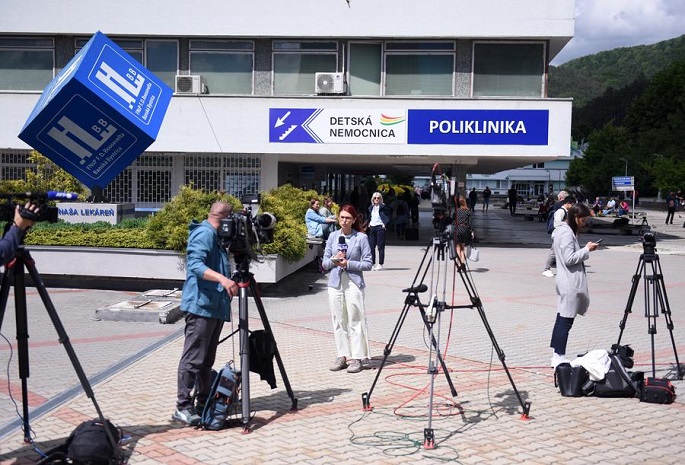Political violence surges in Europe amid rising polarization
Published : 09 Jun 2024, 00:17
Updated : 09 Jun 2024, 00:24
The attack on Denmark's Prime Minister Mette Frederiksen on Friday serves as the latest indication of a troubling surge in political violence sweeping Europe, amid the ongoing European Parliament (EP) elections, reported Xinhua.
Over the past few months, attacks or threats on politicians in Germany, Spain, Ireland, and other European nations, notably including the attempted assassination of the Slovak prime minister and threats against leaders in Poland and Hungary, have further emphasized the growing violence in European politics.
Analysts predict that this wave of political aggression is unlikely to dissipate quickly after the elections, as the underlying causes of these violent acts are deeply complex and multifaceted.
SURGING VIOLENCE IN POLITICS
Days after the shooting of Slovak Prime Minister Robert Fico on May 15, the German Interior Ministry released a report showing that politically motivated crimes in Germany rose by 1.9 percent year-on-year in 2023, reaching a record high of 60,028 cases.
Both Chancellor Olaf Scholz's Social Democratic Party (SPD) and its coalition partner, the Greens, as well as the opposition right-wing Alternative for Germany (AfD), have been affected, sparking concerns in the country.
German sociologist Wilhelm Heitmeyer noted that the AfD's nationalist rhetoric has shifted public discourse towards the extreme right, while left-wing extremists respond with equally radical positions. These tit-for-tat exchanges have escalated social conflicts, creating a political environment inclined to exert violence.
In France, the Interior Ministry recorded 2,387 reports of physical or verbal offense against political representatives in the first three quarters of 2023, some of them violent.
Igor Mekina, editor-in-chief of Insajder.com, a Slovenian news website, contextualized the recent violence within Europe's long history of tensions between nations. He said opposing centers of power and their disputes have been Europe's greatest strength, as well as a curse, from ancient times to medieval city-states and modern Europe.
Political events, such as elections, campaigns and protests, can act as catalysts, bringing underlying tensions and grievances to the fore. A week ago, a German policeman was stabbed to death during an attack on a right-wing demonstration. The attacker also severely injured six others with a knife.
POLARIZATION & INSECURITY
According to exit polls in the Netherlands on Thursday, the first of the 27 European Union (EU) member states to vote for the EP elections on June 6-9, the far-right Dutch Party for Freedom (PVV) is projected to make big gains, in line with pre-election predictions of a rise in populist right sentiment across Europe.
Eric Maurice, an analyst at the European Policy Centre, noted a rise in the political extremes, on both the right and the left, ahead of the EP elections, characterized by increasingly pointed language, and even verbal violence or ad hominem attacks, during political debates.
Political polarization plays a significant role in the recent spate of violence. As political camps exchanged debates in their campaigns, a more aggressive political environment has been widening divisions on vital issues such as the Russian-Ukraine conflicts, immigration, ecology and security.
Mekina argues that Europe is increasingly becoming an extension of U.S. influence following the Cold War, particularly in its stance on the Russian-Ukraine conflicts. This conflict on Europe's borders has mounted pressure on the continent, exacerbating internal disputes and fostering a black-and-white political mindset where extreme actions become more conceivable.
Economic instability is another critical driver of political violence. Unlike Asia and the United States, Europe's post-pandemic recovery has been sluggish. The combined impact of the energy crisis and high inflation has further increased insecurity in Europe.
Geopolitical tensions, economic challenges and disputes over migration cannot be easily solved by the upcoming European Parliament, at least in the short term, but these issues will still erode the public's trust in political institutions. Such public distrust can also explain why some individuals resort to violence to radically express their ideological stance.
A Bertelsmann Foundation study released in February showed that 52 percent of young adults (aged 18-30) expressed distrust in the Federal Government and 45 percent have little confidence in the parliament.
A similar report by the Netherlands Institute for Social Research highlighted increasing public dissatisfaction with the Dutch government, with one-third of citizens advocating for more severe actions against the government and nearly 20 percent believing the system should be overthrown.
The Dutch report pointed to structural inequalities and significant disparities between social groups as sources of this discontent. Such distrust is particularly pronounced among the most vulnerable groups, who experience the worst economic and health conditions and are more likely to resort to violence.
TEMPORARY MEASURES BUT NOT FOR ROOT CAUSES
European governments are now working to stem this wave of violence, typically with increased security presence and crackdowns on hate groups. Several European countries have also reviewed and reinforced security measures for their political figures.
In Slovakia, following the assassination attempt on Fico, security for other government ministers has been increased. In Ireland, Justice Minister Helen McEntee, who received hoax bomb threats, said the government is prepared to bring in new laws to protect politicians from violence, threats and abuse.
On Thursday, Germany's Federal Criminal Police Office announced that the authorities had conducted more than 130 operations nationwide to combat online hate speech and agitation.
Despite these measures, political violence will continue unless Europe addresses its underlying challenges, Hrvoje Klasic, a history professor at the University of Zagreb, warned.
"Western political systems today are ineffective in the face of global challenges. Europe does not have strong leaders, nor does it have a clear concept of how to move towards the future," he told Xinhua.
The case-by-case approaches couldn't tackle the root cause, but in the long run, erode the unity of the EU and the essence of European integration, he added.


